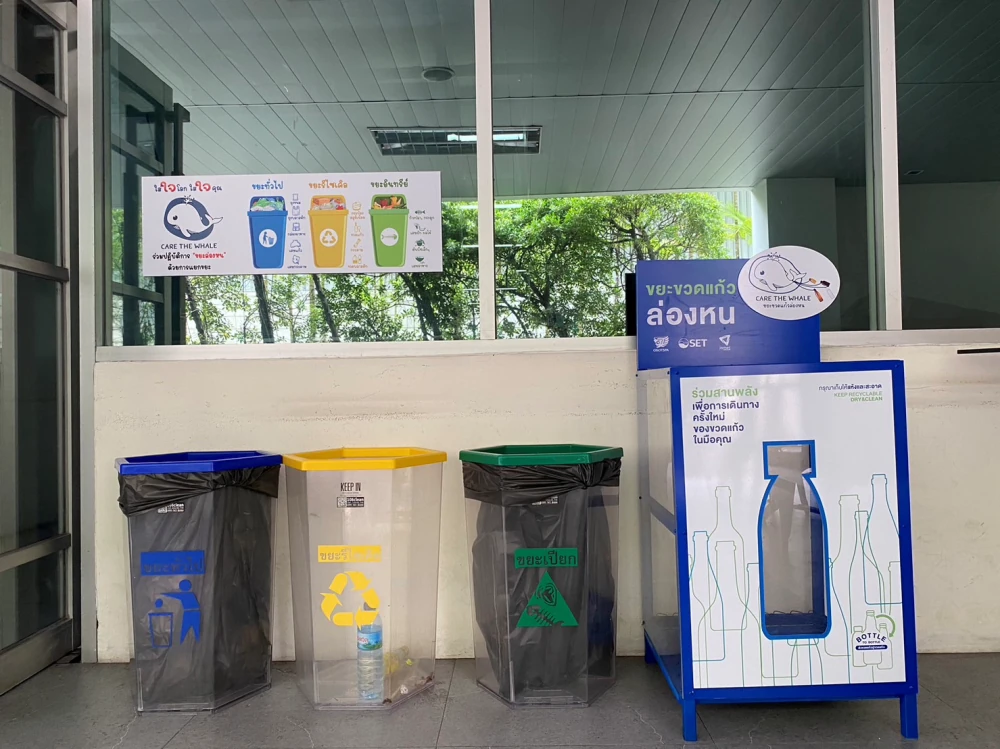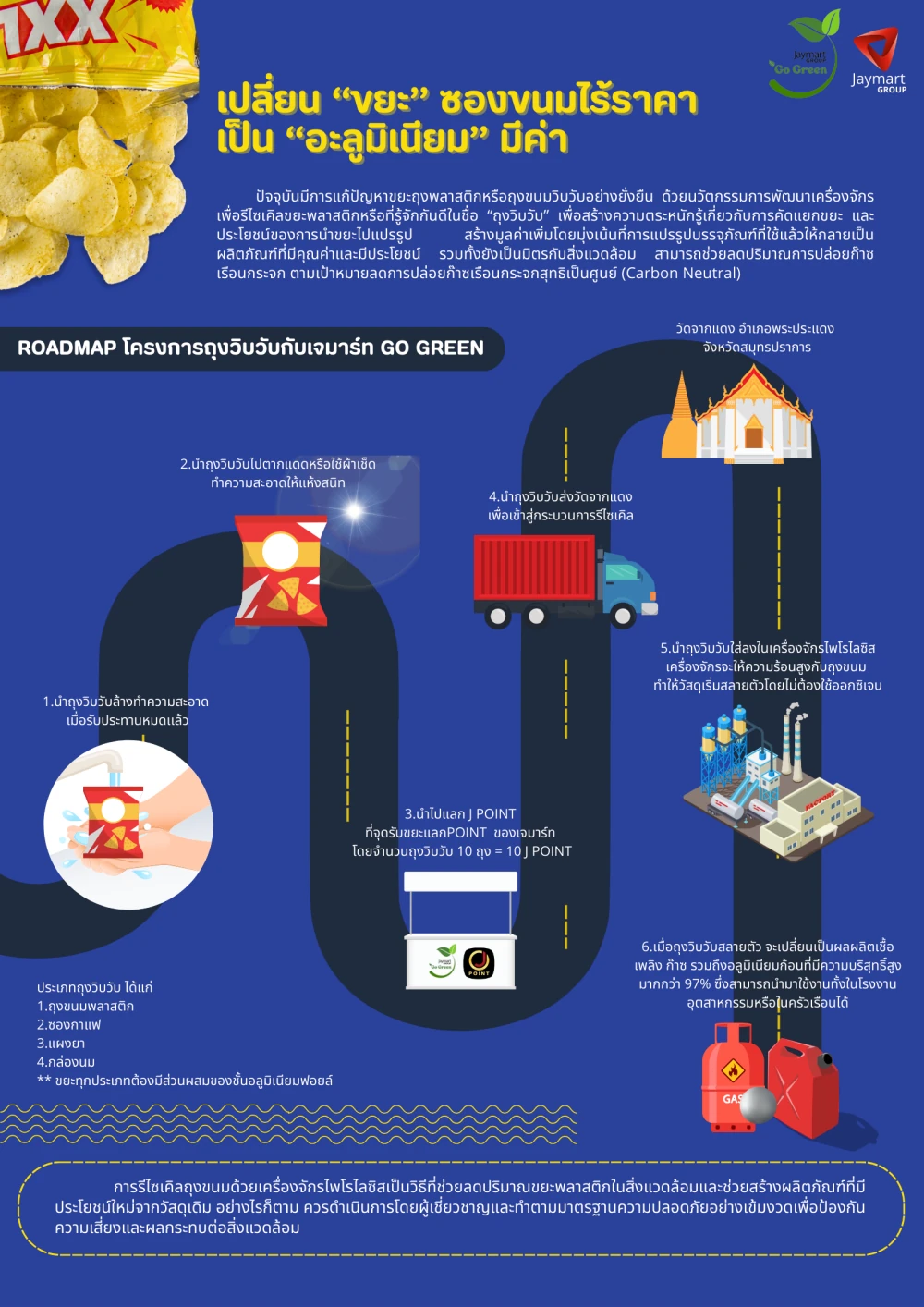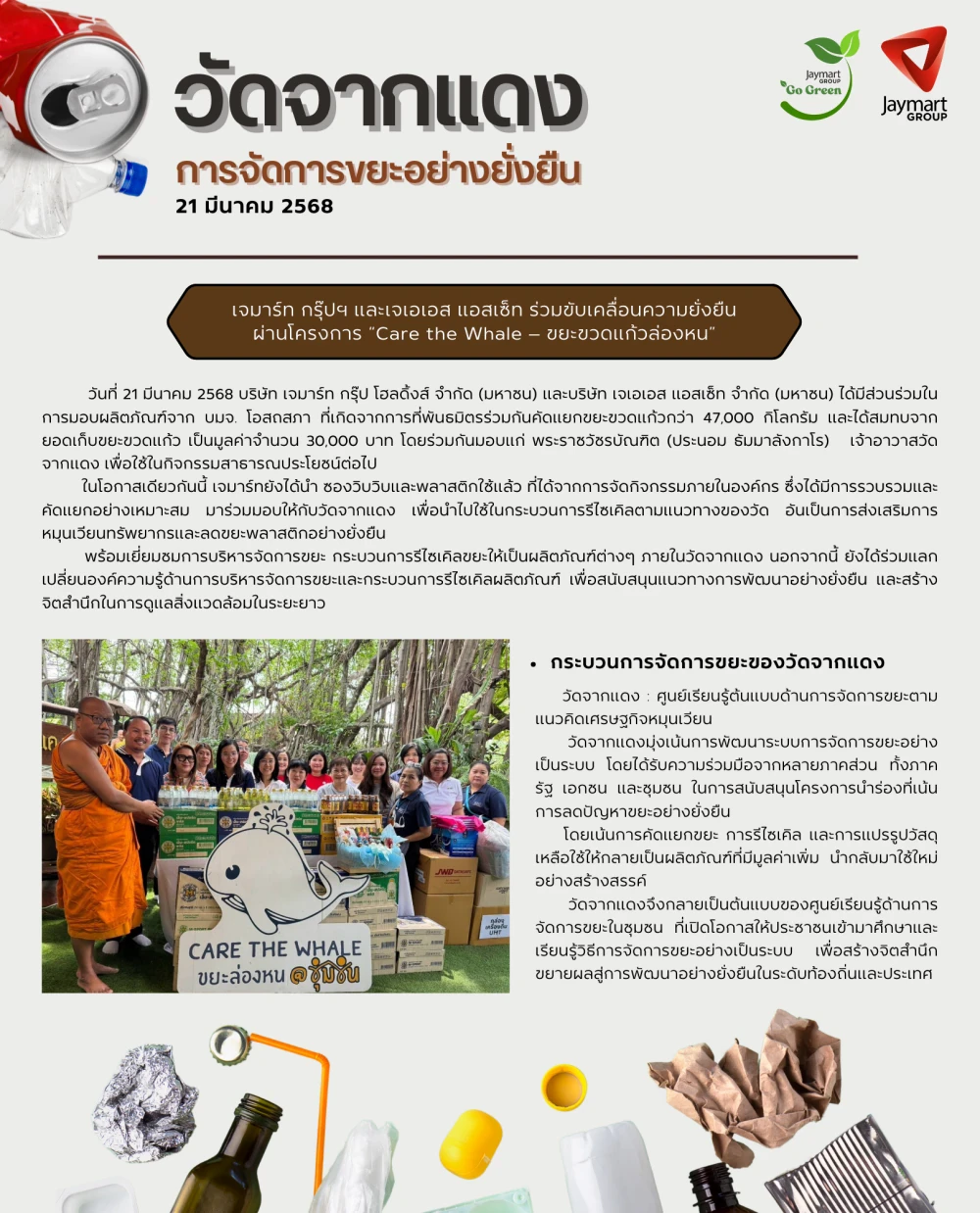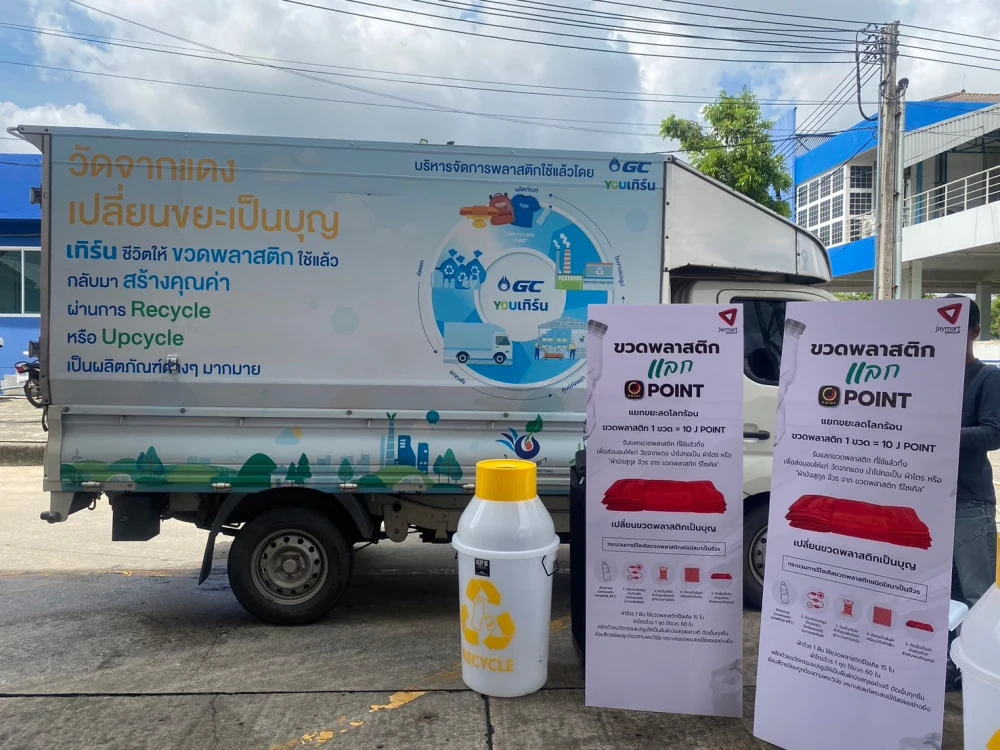Waste and Resource Management
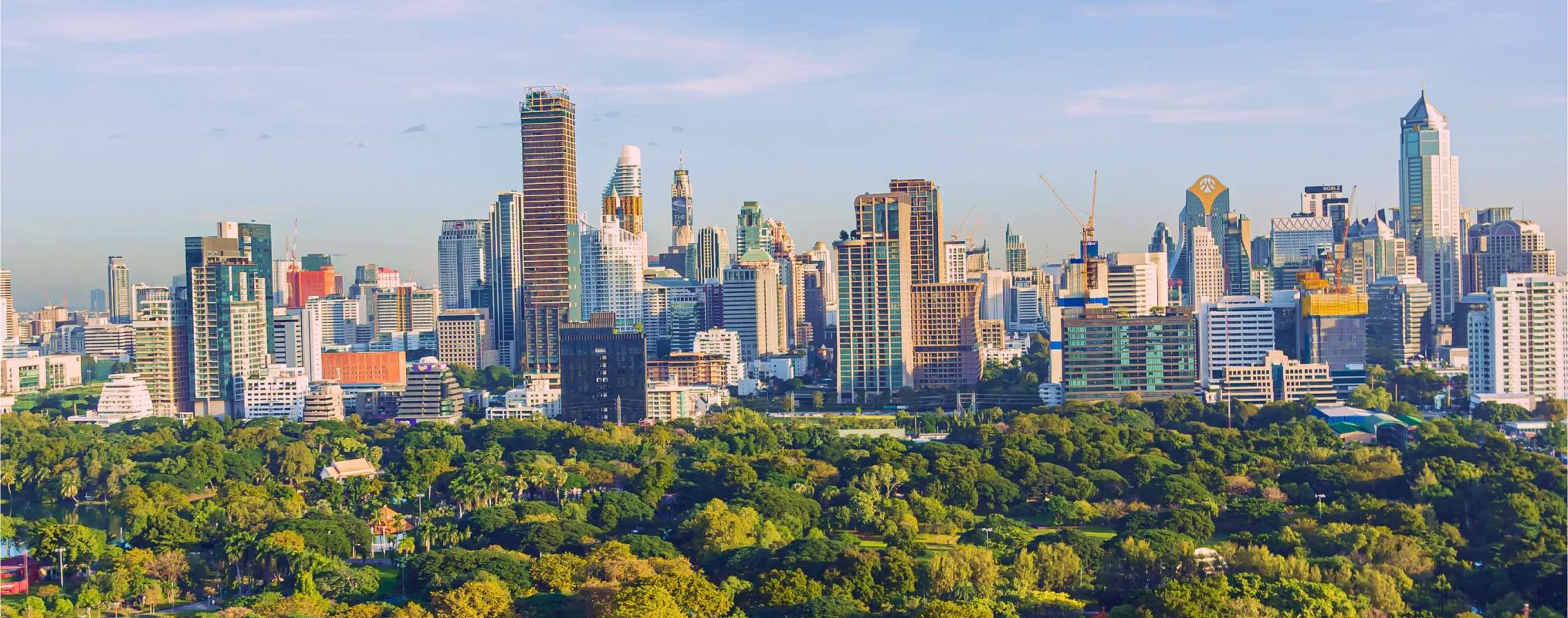
Our Commitment
Jaymart Group Holdings Public Company Limited recognizes the importance of effective pollution management and resource utilization in all business processes to achieve a balance between economic development, environmental conservation, and long-term sustainability.
Jaymart Group recognizes the critical connection between effective waste management and the preservation of ecosystems and biodiversity—particularly in mitigating pollution that may affect wildlife habitats and disrupt natural balance. In line with its commitment to sustainable development, the Company implements a comprehensive waste management policy, grounded in the belief that responsible waste management not only reduces environmental pollution but also plays an essential role in safeguarding biodiversity and fostering resilient ecosystems for future generations.
To achieve these objectives, the Company is dedicated to maximizing waste management efficiency through systematic waste segregation, recycling, and environmentally sound disposal practices. Jaymart Group also promotes active employee engagement in environmental initiatives and builds strategic collaborations with external organizations, local communities, and business partners to expand positive environmental impacts across the value chain.
Furthermore, Jaymart Group has set clear targets to minimize the environmental impact of its business activities, with a strong focus on reducing waste generation and pollution in tangible ways. These approaches are integrated into the Company’s operational processes to ensure genuine and long-term sustainability.
Supporting The SDGs Goal
Advancing global sustainability through alignment with the UN SDGs.
Stakeholders Directly Impacted
Goals
Short-term
- Increase the electronic waste (e-waste) collection rate by 10% by 2026, compared to the 2023 baseline.
- Reduce the amount of waste generated from internal operations by 10% per employee by 2026, compared to the 2023 baseline.
- The amount of waste that can be recycled annually should be no less than 10% of the total waste.
Long-term
- Achieve an e-waste collection rate of 40% by 2030.
Performance Highlights
In 2024, a total of
From January 1 to December 31, 2024, employees collectively sorted and recycled
Management Approach
Jaymart Group Holdings Public Company Limited places great importance on responsible waste management by integrating it into the ESG (Environmental, Social, and Governance) framework to create sustainable outcomes for the organization, communities, and the environment. The Company emphasizes minimizing waste generation at the source, promoting proper waste segregation, and encouraging the reuse of resources through recycling and upcycling processes in order to enhance value, reduce waste, and mitigate potential environmental and social impacts.
Furthermore, the Company is committed to continuously improving its waste management processes, focusing not only on operational efficiency but also on fostering environmental awareness among employees and all stakeholders. This approach ensures that waste management practices deliver tangible results and can be expanded to benefit society at large in a sustainable manner. The Company’s waste management approach includes the following:

Waste Reduction at Source
Jaymart Group Holdings Public Company Limited places great importance on reducing waste generation from the early stages of its operations. The Company focuses on maximizing the value and efficiency of resource use by improving work processes and daily practices, carefully selecting necessary materials and equipment, and promoting employee awareness of minimizing items that generate waste. This includes reducing single-use plastics, choosing reusable packaging, and fostering a culture of resource efficiency in employees’ daily activities. The Company also supports the design of activities and programs that help reduce waste, such as adopting digital technologies to replace paper usage, and creating a work environment that encourages the reduction of unnecessary resource consumption, ensuring that waste reduction at the source achieves clear and sustainable results.

Waste Segregation and Landfill Waste Reduction
Jaymart Group Holdings Public Company Limited encourages systematic waste segregation by providing categorized waste bins within office premises to engage employees in proper waste management practices. In addition, the Company utilizes the Climate Care Platform of the Stock Exchange of Thailand to record the weight of waste, which helps monitor daily waste generation, analyze trends, and develop effective strategies to reduce landfill waste.

Enhancing Partnerships with Stakeholders and the Public Sector
Effective waste management requires the cooperation of all stakeholders. Jaymart Group Holdings Public Company Limited has therefore collaborated with partners and government agencies through various initiatives to support sustainable waste management. The Company participates in the Low Emission Support Scheme (LESS) of the Thailand Greenhouse Gas Management Organization (TGO) and is also a member of the “Care the Whale” network in collaboration with the Stock Exchange of Thailand, aiming to promote sustainable waste management while simultaneously reducing greenhouse gas emissions associated with waste management processes.

Sustainable E-Waste Management for Society and the Environment
The Company recognizes that improper waste management can have significant adverse impacts, particularly hazardous waste such as electronic waste generated from business operations. Therefore, Jaymart Group Holdings Public Company Limited focuses on creating business opportunities through collaboration with like-minded partners, aiming to develop strategies and innovations for more efficient electronic waste management. This ensures that the Company’s business operations generate maximum benefits for both society and the environment.
Jaymart Group Holdings Public Company Limited is committed to conducting business responsibly towards society and the environment, with full awareness of the impacts arising from electronic waste and end-of-life products that are not naturally biodegradable and may contain hazardous chemicals. The Company has thus established a policy for managing electronic waste and end-of-life products in accordance with international standards and aligned with the Sustainable Development Goals (SDGs), encompassing the following operational approaches:
-
1Collaborating with partners and external organizations to serve as a center for collecting and managing electronic waste.
-
2Expanding electronic waste collection points to cover the company's operational areas nationwide.
-
3Sorting and consolidating electronic waste for delivery to organizations with expertise in electronic waste management.
-
4Raising awareness and educating both internally and externally to employees and consumers.
